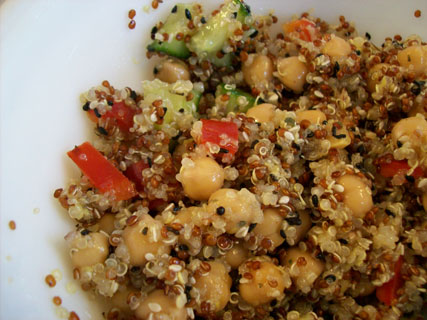Awareness of celiac disease has definitely grown in recent years. It has gone from being misdiagnosed and unknown to a prominent condition recognized for its association to gluten, an umbrella term for a group of proteins found in wheat, barley, and rye, which even Oprah and Miley Cyrus talk about.
What is it? Celiac disease is an autoimmune disease of the small intestine that should be taken seriously. It differs from an allergy and onset is multi-factorial. This means, you must have the genetic predisposition for celiac disease, but then also some sort of environmental cue that causes that genetic script for celiac disease to be expressed. Some studies have shown that this environmental trigger may be a lack of breast feeding, being fed large amounts gluten before ages of 3-4 months, or traumatic events such as surgery, pregnancy, or even sickness. So as you can see, there are many environmental factors that can prompt celiac disease to be expressed, but that the genetics for celiac must be there.
Reactions and treatment. For those with true celiac disease, gluten elicits an inflammatory immune response against the small intestine not only damaging it but also hindering its ability to absorb nutrients. This can lead to nutrient deficiencies which have the potential to develop into osteoporosis and anemia among other conditions. Chronic inflammation of the small intestine can also lead to cancer. In the celiac patient, gluten can produce a wide range of reactions with varying intensities. The only treatment or form of control of the disease is complete elimination of gluten from the diet.
Gluten sensitivity is a separate condition that has some crossover with celiac disease in regards to the uncomfortable symptoms, but yet differs in that there are no biological markers and no antibodies to identify it. Also Guandalini pointed out that unlike celiac disease, there is an absence of any associated diseases (comorbidities) or intestinal damage resulting from gluten ingestion with gluten sensitivity. Unfortunately, because of the lack of biological indicators, gluten sensitivity is difficult to diagnose and in turn relies on ruling out of other diseases for its determination. This is one of the reasons we cannot pinpoint a prevalence of gluten sensitivity. We just don’t have enough information to know.
Diagnosing celiac disease. Have you thought of going on a gluten elimination diet to  determine if you have celiac disease? You might anticipate that if you feel better on a gluten free diet then you have celiac disease. This is not necessarily the case. Guandalini and Fassano pointed out that an elimination diet should be avoided if you want a diagnosis. When you eliminate gluten from the diet, you eliminate the ‘damage’ or markers of celiac disease, which can lead to ruling out celiac disease when you may very well have it. They recommend that if you suspect you have celiac disease it is best to schedule an appointment with your doctor and set up a biopsy or antigen test to determine if you have celiac disease. If you rule out celiac disease but still have symptoms you will want to test for a wheat allergy. If you are able to rule out both conditions as well as other clinically overlapping diseases, it may be determined that you have gluten sensitivity. Knowing your diagnosis means you can better treat and control your condition. It also allows you to avoid unwarranted elimination of healthful components of the diet.
determine if you have celiac disease? You might anticipate that if you feel better on a gluten free diet then you have celiac disease. This is not necessarily the case. Guandalini and Fassano pointed out that an elimination diet should be avoided if you want a diagnosis. When you eliminate gluten from the diet, you eliminate the ‘damage’ or markers of celiac disease, which can lead to ruling out celiac disease when you may very well have it. They recommend that if you suspect you have celiac disease it is best to schedule an appointment with your doctor and set up a biopsy or antigen test to determine if you have celiac disease. If you rule out celiac disease but still have symptoms you will want to test for a wheat allergy. If you are able to rule out both conditions as well as other clinically overlapping diseases, it may be determined that you have gluten sensitivity. Knowing your diagnosis means you can better treat and control your condition. It also allows you to avoid unwarranted elimination of healthful components of the diet.
Is gluten bad for me? Which brings us back to the question, is avoiding gluten healthy for everyone? The confident answer from both doctors was no, gluten should only be avoided in those with celiac disease and sensitivity. There is no scientific evidence to show avoiding gluten improves health status or body weight. Dr. Guandalini, a natural born Italian, even pointed out that on average Americans consume 84 kg of wheat/person /year and we have an obesity rate of about 30.6% while the Italians consume approximately 148 kg wheat/person /year and the country has an obesity rate of merely 8.4%. So it is easy to see that wheat and gluten consumption don’t necessarily go hand in hand with obesity and poor health.
Balance. Ultimately, it comes back to balance in regards to life and diet. You shouldn’t consume only grains, but you shouldn’t entirely avoid them either. Balance intake of grains with lean protein, low fat or fat free dairy, fruits and vegetables, healthy unsaturated fats, and minimal amounts of sweets, sodium, saturated fats, and trans fats and find time for physical activity and relaxation. If you have celiac disease, avoid all wheat, barley, rye, and sometimes oat products and focus on other healthy whole grain gluten free options such as amaranth, millet, or quinoa.

Celiac diseases support and resources. Sellers pointed out that many unsuspecting sources of gluten such as long lasting lipstick, imitation sea food, flavored coffee, and even some spices (due to anti-caking agents) should be avoided with celiac disease (check with the manufacturer if you are uncertain of gluten content). If you have celiac disease, a good recommendation is, “when in doubt, leave it out”. If going out to eat or at a party, be sure to ask about preparation methods, ingredients used, even if pans, utensils or plates were shared with wheat, barley, or rye products so you can avoid any gastrointestinal
distress or damage. If you have celiac disease or suspect sensitivity, it is wise to see your doctor first for diagnosis and then consult with a dietitian to ensure you follow a healthy, happy, gluten free diet. Visit the University of Chicago Celiac Disease Center website for more information on receiving a free Gluten Free Care Package.
If this article was helpful to you, please share it via the buttons at the top of the page or Share this on Facebook directly with the link.
Quinoa photo credit: jazzijava via photopin cc
Doctor photo credit: Alex E. Proimos via photopin cc
Works Cited:
Fassano, Alessio and Sellers, Carren. Celiac Disease: It’s not just the digestive tract. Academy of Nutrition and Dietetics Food and Nutrition Conference and Expo. Pennsylvania Convention Center, Philadelphia, PA. 7 Oct 2012. Conference Presentation.
Fassano, Alessio and Guandalini, Stefano. Understanding Gluten Related Disorders. Academy of Nutrition and Dietetics Food and Nutrition Conference and Expo. Pennsylvania Convention Center, Philadelphia, PA. 7 Oct 2012. Conference Presentation.




